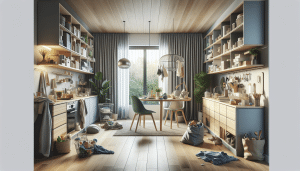Minimalist Living Secrets You Need for a Clutter-Free Life
Jessica White November 15, 2025
Discover how minimalist living can create a more peaceful and organized lifestyle. This deep dive explores practical techniques, mindset shifts, and surprising benefits for those who want to enjoy clutter-free spaces and greater well-being.
What Is Minimalist Living and Why Is It Gaining Popularity
Minimalist living is all about reducing excess and focusing on what truly matters. This lifestyle encourages individuals to declutter their physical spaces, prioritize meaningful belongings, and shift habits toward simplicity. The core idea rests on the belief that less can indeed be more, especially when it comes to peace of mind and quality of life. Many find that embracing intentional living reflects not only in tidier homes but also in calmer, more satisfied lifestyles. Interest in minimalism has surged thanks to a desire for better work-life balance, improved mental wellbeing, and reduced stress from overwhelming clutter.
People are increasingly drawn to minimalist principles for various reasons. Some crave more time and freedom, tired of managing possessions that don’t bring genuine value. Others feel motivated to save money, reduce waste, or adopt eco-conscious habits. Home organization trends featured in lifestyle magazines and television have shed light on how straightforward changes can transform daily life. Approaching minimalism doesn’t require drastic sacrifices; even small shifts in decluttering can inspire a sense of ease and contentment. The important thing is to find a style that feels sustainable, not restrictive.
Surveys show a link between minimalist living and overall wellness. Individuals who cut down on clutter often experience reduced anxiety, improved productivity, and better sleep quality (Source: https://www.niehs.nih.gov/health/topics/conditions/sleep). Moving towards a minimalist lifestyle can feel liberating and empowering, especially when the journey is tailored to individual preferences and priorities. This growing popularity underscores how even a few minimalist secrets can help create environments that support creativity, focus, and happiness.
Decluttering Your Space for Lasting Peace of Mind
Effective decluttering is central to minimalist living, but it goes beyond emptying drawers or tossing old clothes. Thoughtful organization creates relaxing, functional spaces. Start by focusing on a single category—like clothing, books, or paperwork—and sort everything according to what is truly needed or meaningful. Donate, recycle, or responsibly dispose of items that no longer serve a positive role at home. Minimalists often recommend the “one in, one out” rule: for every new item, let go of something similar. This strategy supports intentional acquisition and continuous clutter control.
Even those living in small apartments or shared spaces can reap the rewards of efficient decluttering. Vertical storage solutions, multi-purpose furniture, and transparent bins make organization visually appealing and highly functional. Simplicity aids maintenance. Investing in smart storage pays off by making daily routines smoother—no more frantic searches for lost items. It’s about more than appearance; it’s about shaping a home that consistently feels calm and manageable (Source: https://www.apa.org/monitor/2019/01/ce-corner).
Researchers link clutter with heightened cortisol—a stress hormone—particularly among women. Regular decluttering has been shown to relieve tension, foster relaxation, and improve focus. Organizing physical spaces supports emotional order, too. Many find that setting a weekly “mini declutter” ritual, even five minutes each day, maintains the positive effects of minimalist design. Consistency is key. Over time, these rituals become habits that anchor a peaceful environment, benefiting everyone in the household.
Mindset Shifts and Habits that Support Minimalist Lifestyles
Adopting a minimalist mindset means learning to prioritize experiences over possessions. This mindset values time, personal growth, and emotional clarity more than overflowing closets or gadgets. Instead of seeking happiness in buying, minimalists often focus on self-reflection to determine what items and commitments provide genuine satisfaction. Visual reminders, such as a vision board or a carefully curated shelf, help reinforce these values and maintain motivation to declutter over the long run.
Forming sustainable minimalist habits often begins with small, regular changes. For example, making beds each morning or keeping a clean kitchen counter can set the tone for tidiness the entire day. Setting boundaries for incoming items—or even digital clutter, like emails—contributes to a sense of order. Many find tracking spending, unsubscribing from mailing lists, or simplifying their schedule helps avoid unnecessary accumulation both at home and digitally. The result is increased time for relationships, hobbies, and self-care (Source: https://www.mindful.org/declutter-your-mind/).
Adjusting to minimalist living can challenge deeply ingrained consumer habits and social expectations. However, those who persevere often report greater clarity and purpose. The minimalist approach also offers flexibility: there’s no universal mold to follow. Finding a unique balance between personal needs and simplicity enables lasting success with this lifestyle. Remember, the journey itself offers insights—progress, not perfection, is what nurtures a sense of accomplishment and happiness.
Benefits of Minimalist Living Beyond the Home
Minimalist living provides powerful benefits reaching far beyond home interiors. People who embrace minimalism often report enhanced financial health through conscious spending and reduced impulse buying. Budgeting becomes simpler as priorities shift towards experiences rather than accumulating things. For many, these habits translate to greater financial security and the freedom to pursue travel, education, or creative projects. Minimalist living supports intentional choices about how time, energy, and resources are distributed.
This lifestyle’s influence extends to better health and environmental impact. Reducing consumption lowers one’s carbon footprint and waste. Individuals are more likely to support local businesses, choose durable goods, or participate in circular economies focused on repair and reuse. Even digital minimalism—paring down app usage or technology—can improve sleep and concentration (Source: https://www.ncbi.nlm.nih.gov/pmc/articles/PMC6775445/). These changes, while subtle, can significantly enhance everyday well-being and satisfaction.
Socially, minimalism can deepen relationships. Time saved from household chores or shopping can be invested in social gatherings, family events, or community activities. Many minimalists find they are able to give more attention to their closest relationships. By paring back distractions, they make room for authentic connections and shared experiences. Ultimately, minimalist living is about creating space for what genuinely matters, both inside and outside the home.
Practical Steps to Start Living Minimally Today
Getting started with minimalism doesn’t require major upheaval. Begin by identifying areas of daily frustration, like cluttered closets or overloaded schedules. Tackle one small area at a time—a single drawer, a shelf, or even digital files. Give attention only to things that add value or joy. Setting achievable goals makes the process manageable and rewarding, minimizing overwhelm.
Embracing minimalism can be a family or household affair. Involve all members by discussing shared goals, creating organization routines, and celebrating progress together. Many families report improved communication and cooperation when everyone plays a role in sustaining a comfortable living space. For individuals, journaling or photographing progress can provide ongoing encouragement. Minimalists often recommend revisiting “why” regularly to stay motivated and adjust priorities as circumstances evolve (Source: https://www.psychologytoday.com/intl/blog/a-new-path-purpose/202009/what-does-living-simply-really-mean).
Resources abound for those seeking minimalist inspiration. Online forums, digital guides, and local workshops provide support. Various challenges—such as “30-day declutter” events—help keep the process motivating and fun. Remember, sustainability matters more than speed. Adopting minimalist living is a journey, and each positive step contributes to a more balanced, happy life.
How Minimalism Inspires Lifestyle Redesign
Minimalism encourages a holistic approach to lifestyle changes that extend into health, leisure, and personal growth. Some individuals apply minimalist principles to fitness routines, meal planning, or wardrobe choice, reducing decision fatigue and freeing up mental space for creative pursuits. The result is an intentional, rejuvenating daily rhythm. Less clutter and fewer distractions make time for nourishing hobbies, outdoor adventures, or restful downtime.
People integrating minimalist values report a new sense of autonomy over their schedules. With fewer unnecessary commitments, it becomes easier to create boundaries and allocate energy toward long-term goals. Mindful living can foster a culture of gratitude, self-acceptance, and lifelong learning. As habits shift gradually, these changes enhance resilience and adaptability in the face of life’s inevitable transitions (Source: https://www.health.harvard.edu/mind-and-mood/mindfulness-and-mental-health).
Ultimately, minimalist living invites creativity and possibility. It isn’t just about what to remove from daily routines, but also about what to add—purpose, space, and fulfillment. Renewed focus can spark deeper engagement with arts, volunteerism, travel, or other passions. Minimalist inspiration is about curating a life—not just a living space—that feels expansive, meaningful, and uniquely enjoyable for every individual.
References
1. National Institute of Environmental Health Sciences. (n.d.). Sleep and Health. Retrieved from https://www.niehs.nih.gov/health/topics/conditions/sleep
2. American Psychological Association. (2019). The power of decluttering. Retrieved from https://www.apa.org/monitor/2019/01/ce-corner
3. Mindful. (n.d.). Declutter Your Mind. Retrieved from https://www.mindful.org/declutter-your-mind/
4. National Library of Medicine. (2019). Digital Minimalism: Choosing a Focused Life in a Noisy World. Retrieved from https://www.ncbi.nlm.nih.gov/pmc/articles/PMC6775445/
5. Psychology Today. (2020). What Does Living Simply Really Mean? Retrieved from https://www.psychologytoday.com/intl/blog/a-new-path-purpose/202009/what-does-living-simply-really-mean
6. Harvard Health Publishing. (n.d.). Mindfulness and mental health. Retrieved from https://www.health.harvard.edu/mind-and-mood/mindfulness-and-mental-health








